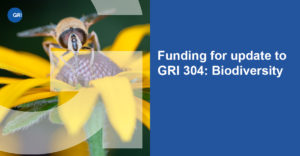
As the global community marks World Environment Day (5 June), the growing biodiversity crisis emphasizes why businesses need to step up and be accountable for their impacts on the world, with an updated reporting standard for biodiversity required. The Biodiversity Standard (GRI 304) is used annually by at least 2,000 organizations, out of the more than 10,000 companies reporting with the GRI Standards. However, KPMG research from December 2020 indicates less than a quarter of large companies at risk from biodiversity loss disclose on the topic. A revised Standard could support many more organizations to address their role in biodiversity, and meet stakeholder expectations for transparency.
The GRI Standards are provided as a free public good, offering the common global language for dialogue on societal, environmental and economic impacts. Yet funders are needed to enable GRI to complete the costly process of researching, developing and delivering a revised Biodiversity Standard.
Funding of more than €150,000 (US$180,000) has now been secured, as a special project under the Global Standards Fund, allowing GRI to initiate plans for the project. Together, international services firm KPMG, Brazilian environmental services company Ambipar and US-based One Earth (along with a private individual donation) have committed their support while subscribing to GRI’s neutral standard setting process.
Wim Bartels, Global Co-Head, KPMG IMPACT Measurement, Assurance & Reporting, said: “Biodiversity loss is one of the biggest ESG challenges both for the planet and society at large and it can only be prevented if we all push for urgent and necessary changes. Companies must now demonstrate how they serve society alongside creating long-term value for shareholders. Good ESG reporting equates to good financial reporting and KPMG supports impact-focused global standards. We are therefore delighted to support GRI on the development of its latest Biodiversity Standard.”
Cristina Andriotti, President of Ambipar, explained: “Ambipar uses the GRI Standards for the credibility, impartiality and trust in their process. We believe that through the implementation of the GRI Standards it is possible to realize our globally recognized ESG goals and indicators, enabling transparent communication with our stakeholders. For this reason, and because we believe in the importance of biodiversity for the planet being the responsibility of us all, we support the new GRI Biodiversity Standard.”
Karl Burkart, Deputy Director of One Earth, said: “One Earth is committed to fostering collaboration to achieve the urgent action needed to tackle climate change. The decimation we are seeing to global biodiversity is undeniably linked to the effects of climate change. Therefore we are pleased to partner with GRI to support an updated and globally applicable Biodiversity Standard. It is only by taking collective responsibility for impacts that organizations can contribute towards solutions that safeguard our planet.”
Marco van der Ree, GRI Chief Development Officer, added: “From damaging rural economies, the health of our oceans, to reducing the availability of raw materials, not only does the planet suffer due to biodiversity loss but organizations are financially affected in many ways. Indeed, recent research by Swiss-Re found 55% of our global GDP depends on well-functioning ecosystems. Therefore, the incentive for companies to contribute towards global solutions has never been greater. Understanding their impacts is step one towards that goal.
GRI is committed to providing the global common language for sustainability reporting, as a catalyst for change. The Global Sustainability Standards Board regularly reviews and update the Standards, so they reflect the leading global practice to report on critical sustainability impacts. I am thankful to the four initial funders for contributing to a new Biodiversity Standard, which will illuminate the urgent challenges we face.”
GRI is continuing to seek additional funders, to ensure the updated Biodiversity Standard is delivered by the end of 2022.



